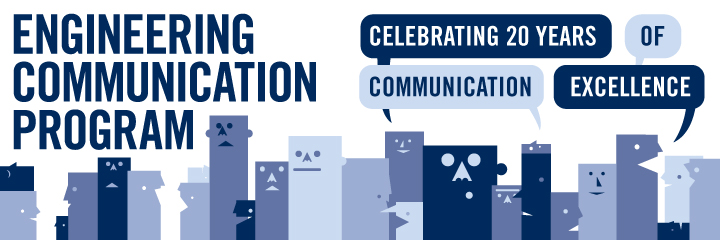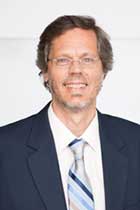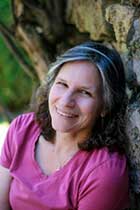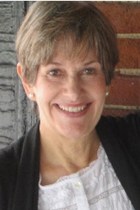
ECP celebrated its 20th anniversary in 2015-16 by hosting a Speaker Series featuring these distinguished guests:
Written Communications by Design
Dr. Brian Frank, Queen’s University
Wednesday, December 2, 2015
Rendering Visible the Social Justice Dimensions in Engineering Education
Dr. Jon Leydens, Colorado School of Mines
Thursday, February 18, 2016
Communication in Project Teams: Roles and Strategies for Faculty
Dr. Marie Paretti, Virginia Tech
Thursday, March 17, 2016
Diagnostic assessment in first-year, undergraduate engineering: Building connections from diagnostic to learning
Dr. Janna Fox, Carleton University
Tuesday, April 19, 2016
Written Communications by Design
Dr. Brian Frank, Queen’s University
This session will focus on some recent approaches to developing and assessing written communications in undergraduate engineering programs. Brian will present the spiral development model used in the engineering design and practice sequence at Queen’s University, and talk about how they focus on argumentation and communicating mathematical models. He will also talk about how students’ written communication skills develop over time, and approaches to assessing communications skills. We will provide a promoting question to discuss over lunch, and in small groups consider various approaches to developing written communication skills, and approaches to assessing how students develop it over time.
Brian Frank is the Director of Program Development and the DuPont Canada Chair in Engineering Education Research and Development in the Faculty of Engineering and Applied Science, and an associate professor in the Department of Electrical and Computer Engineering at Queen’s University in Kingston. He coordinates Engineering Practice, a required first-year engineering course which focuses on topics including design, communications, and complex problem-solving. He is the co-principal investigator of the Queen’s Learning Outcomes Assessment Consortium project, a longitudinal study assessing transferable skills, including communications.
Rendering Visible the Social Justice Dimensions in Engineering Education
Dr. Jon Leydens, Colorado School of Mines

Engineers solve complex, open-ended problems. Such problems do not exist in a vacuum but in a social context that shapes (and is shaped by) technical problems. In that sense, engineers solve sociotechnical problems. However, in much of engineering education, the social and technical dimensions of problems are bifurcated. How might that separation be a disservice to burgeoning engineers and applied scientists? What benefits might ensue from contextualizing technical problems and showing real-world applications and consequences? How can a social justice framework help crystalize sociotechnical connections?
This workshop treats those queries as background, as we inquire into two primary questions: Why are the social justice dimensions inherent to sociotechnical, engineered systems often invisible in engineering curricula? What framework/criteria can we use to render those dimensions visible in design and communication courses for engineering students, particularly in ways that bolster the learning of technical and relevant social content, and, more importantly, that teach students how to integrate those dimensions into the phases of problem defining and problem-solving? These questions sit at the nexus of engineering ethics, pedagogy, design, and communication, and the workshop will focus on reasons and ways to forge connections between sociotechnical engineering and social justice.
Jon A. Leydens is an associate professor in the Division of Liberal Arts and International Studies at the Colorado School of Mines, USA, where he has been since 1997. Research and teaching interests include communication, social justice, and engineering education. Dr. Leydens is co-author of Engineering and Sustainable Community Development (Morgan and Claypool, 2010) and editor of Sociotechnical Communication in Engineering (Routledge, 2014). Dr. Leydens won the James F. Lufkin Award for the best conference paper—on the intersections between professional communication research and social justice—at the 2012 International Professional Communication Conference. In 2015, he won the Ronald S. Blicq Award for Distinction in Technical Communication Education from the Professional Communication Society of the Institute for Electrical and Electronic Engineers (IEEE). His current research focuses on rendering visible and integrating the social justice dimensions inherent in three components of the engineering curriculum—in engineering sciences, engineering design, and humanities and social science courses. That research, conducted with co-author Juan C. Lucena, will culminate in Engineering Justice: Transforming Engineering Education and Practice (Wiley-IEEE Press, 2017).
Communication in Project Teams: Roles and Strategies for Faculty
Dr. Marie Paretti, Virginia Tech

Often we think of engineering communication in terms of written documents or formal presentation, but it also involves the day to day interactions among team members as individuals exchange ideas, negotiate conflicts, and seek collaborative solutions to engineering design challenges. At the same time, these team experiences often play a critical role in shaping engineering students’ sense of professional identity as they interact with peers and faculty in doing engineering work. In this talk, we will explore the beliefs of engineering faculty and engineering students about team communication and examine practices expert faculty use as they are mentoring teams and helping students develop critical skills in interpersonal communication. We will look at research results from multiple studies on communication in engineering teams and discuss both theoretical and practical issues for faculty and students.
Marie C. Paretti is an Associate Professor of Engineering Education at Virginia Tech, where she co-directs the Virginia Tech Engineering Communications Center (VTECC). She received a B.S. in chemical engineering and an M.A. in English from Virginia Tech and a Ph.D. in English from the University of Wisconsin-Madison. Her research focuses on communication and collaboration, design education, and identity (including race, gender, class, etc.) in engineering. She was awarded a CAREER grant from the National Science Foundation to study expert teaching in capstone design courses and is co-PI on numerous NSF grants exploring communication, teamwork, design, and identity in engineering. Drawing on theories of situated learning and identity development, her work includes studies on the teaching and learning of communication, effective teaching practices in design education, the effects of differing pedagogies on personal and professional identities, the dynamics of cross-disciplinary collaboration in both academic and industry design environments, and gender and identity in engineering. When not at work, she can be found pulling weeds in her garden or bicycling the back roads of Craig County, VA.
Diagnostic assessment in first-year, undergraduate engineering: Building connections from diagnostic to learning
Dr. Janna Fox, Carleton University

In this interactive workshop, Dr. Fox will draw on the example of a diagnostic approach in first-year, undergraduate engineering at Carleton University to discuss the potential of early diagnosis and targeted, individualized learning support in increasing retention and academic success. Now in its sixth year, she will review what they have learned, with a particular focus on the development of individual learning profiles to support learning. In the session, she will examine how the resources came together for the diagnostic approach and explore the potential of such an approach in other undergraduate engineering contexts.
Janna Fox, Ph.D., is an Associate Professor and Director of the Language Assessment and Testing Research Unit within the School of Linguistics and Language Studies, Carleton University, Canada, where she teaches courses on research methods, language testing, and curriculum. She is currently investigating the role of diagnostic assessment in providing pedagogical support for students in undergraduate engineering in order to increase retention and academic success. She is the principal developer of a number of high-stakes language tests including the Canadian Academic English Language (CAEL) Assessment, and was awarded the 3M Teaching Fellowship for leadership and scholarship in higher education. She serves on the Board of Paragon Testing Inc., Vancouver, Canada.
